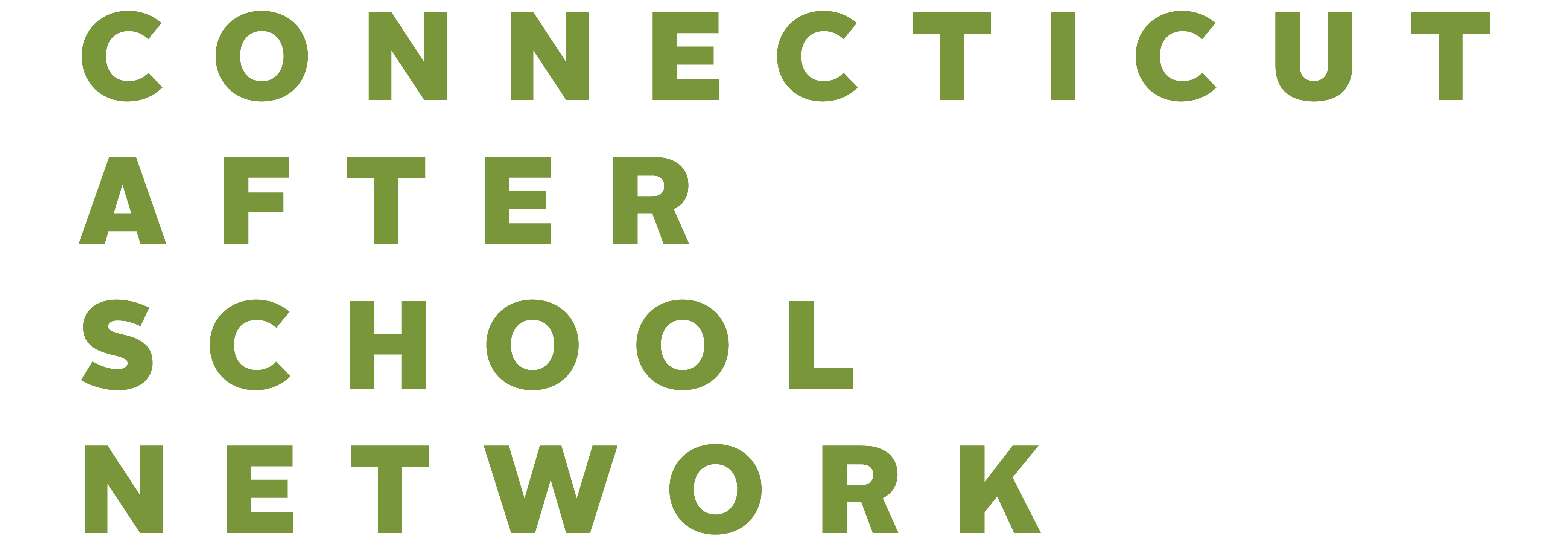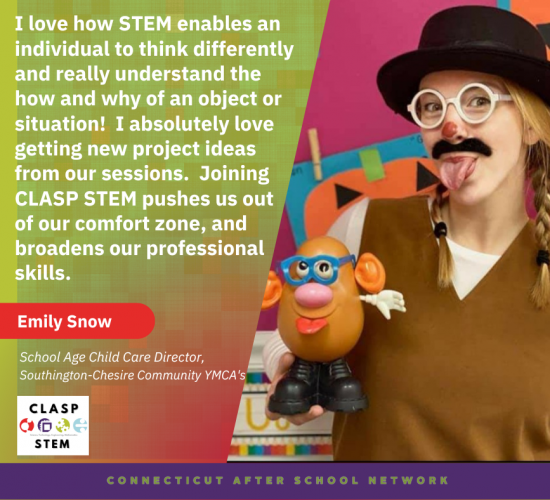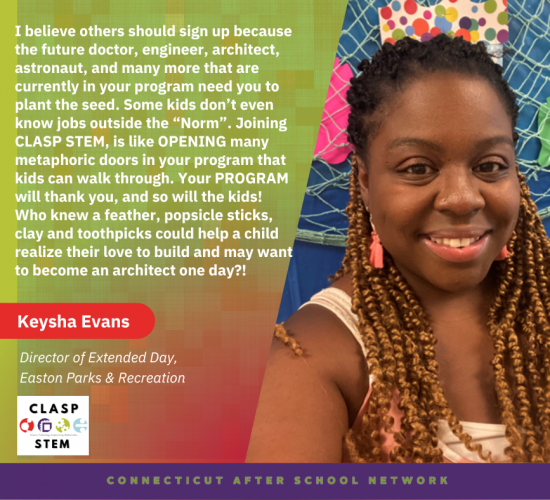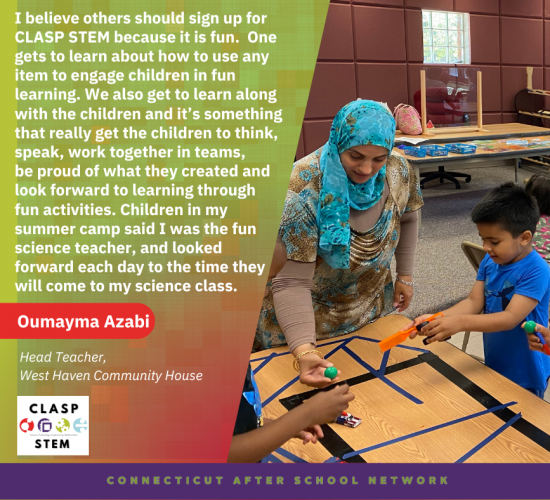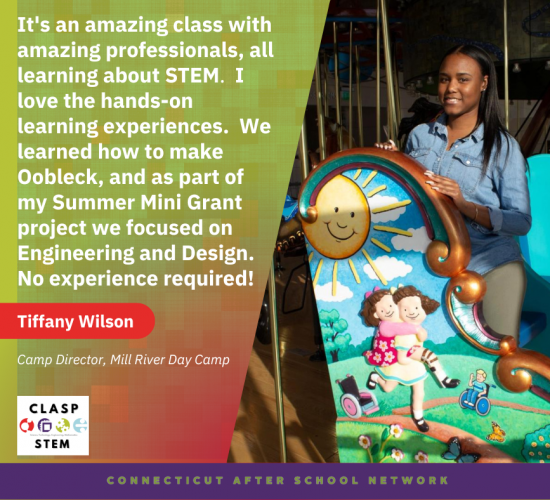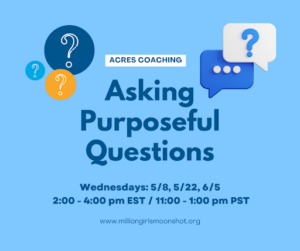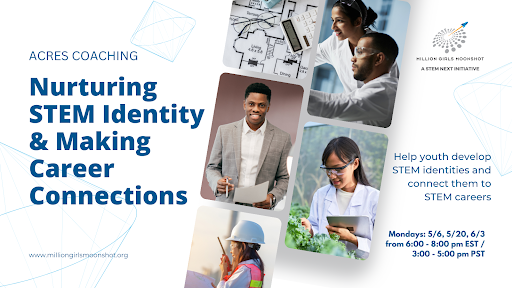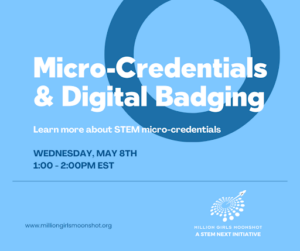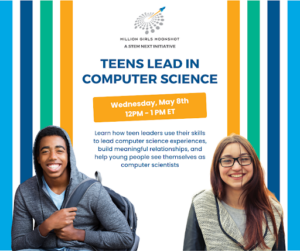Sign up for our Quarterly STEM Newsletter here.
NEXT ISSUE: JULY 2024
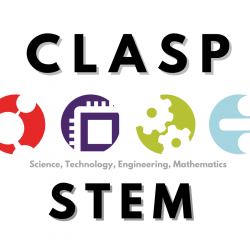
Our CLASP STEM Cohort allows out of school time professionals an excellent place to explore fun, unique STEM practices and opportunities for young people. The program connects realistic, relevant and hands-on learning and networking opportunities for you as an educator to add to your resources, practices and tools that will help you build opportunities for supporting the young learners in your programs to find the possibilities and skills that come from powerful learning experiences and thoughtful partnerships.
Our new CLASP STEM cohort began earlier this year. The cohort is getting ready to write their 2024 grant proposals for their summer camp programs. They already visited places like Eli Whiteney Museum and Sacred Heart University’s planetarium.
See what our participants have to say about their CLASP experience.
Monthly Padlets
PROFESSIONAL DEVELOPMENT
The expectation is that you will be live at all three sessions and an active member of this coaching cohort. Recordings are not available if you are unable to attend.
MAY 8, MAY 22 & JUN 5
2:00 – 4:00 PM
Questions begin a path toward discovery, imagination, and STEM exploration. How can we help youth expand and clarify their thinking and develop their reasoning through the questions we ask them? This module is a great way to train staff on how to facilitate STEM learning. Experienced educators also love being part of a cohort as a way to connect with other educators across the country, to learn new lesson plans, and to reflect on practice. This is our introductory module and a prerequisite to other opportunities. *The expectation is that you will be live at all three sessions and an active member of this coaching cohort. Recordings are not available if you are unable to attend.
REGISTER HERE
MAY 6, MAY 20 & JUN 3
6:00 – 8:00 PM
How do you help youth recognize their connection to and role in STEM? How do you help youth learn about STEM careers? Participants experience several easy-to-implement strategies, including a photo elicitation activity that can help youth form STEM identities, and then learn how to conduct related activities with youth. *The expectation is that you will be live at all three sessions and an active member of this coaching cohort. Recordings are not available if you are unable to attend.
REGISTER HERE
MAY 8
1:00 – 2:00 PM
ACRES (Afterschool Coaching for Reflective Educators in STEM) is excited to offer additional Information Sessions about STEM micro-credentials, which are competency-based, digital badges for afterschool and out-of-school professionals offered through the National Afterschool Association. These sessions are free, live, interactive, and one hour in length. You will learn about what Micro-credentials are and how to apply for them.
PLEASE FILL OUT THIS FORM, choose the date that works best for you, and we’ll reach out to you with the Zoom link. FMI contact acres@mmsa.org (Note: It isn’t necessary to attend more than one informational session as the content is consistent.)
MAY 8
12:00 – 1:00 PM
Teens can develop a wide variety of interests and skills, including leadership by working or volunteering in out-of-school time computer science programs. Learn more about how teen leaders use their skills to lead computer science experiences and build meaningful relationships and help young people see themselves as computer scientists. Teen leaders are essential components of many 4-H programs across the US. Join this virtual workshop to learn more about how the 4-H experiential learning model helps young people grow and develop through these experiences. This approach develops leadership and prepares young people to be the leaders, innovators and problem-solvers of our future.
REGISTER HERE
Projects & Activities
Asian American and Pacific Islander Heritage Month
Asian American and Pacific Islander Heritage Month is celebrated in the United States during the month of May. It recognizes the significant contributions and influence of Asian Americans, Native Hawaiians, and Pacific Islander Americans to the history, culture, and achievements of the United States.
World Bee Day
World Bee Day is celebrated on May 20. On this day Anton Janša, the pioneer of beekeeping, was born in 1734. The purpose of the international day is to acknowledge the role of bees and other pollinators for the ecosystem.
World Migratory Bird Day
World Migratory Bird Day was established by the United Nations in 2006 to raise awareness of the migratory linkages between regions of the globe1. It is celebrated on the second weekend of May and in October each year, recognizing the cyclical nature of bird migration and the different peak times of migration along the world’s flyways.
Monthly Activities
- PLT_GreenJobs_MonitoringForestHealth.pdf Through a variety of health indicators, learners assess the health of a forested area and see how soil scientists, wildlife biologists, arborists, and other forest professionals monitor forests. This activity supports STEM identity by relati through role model and career connections.
Do-It-Yourself DNA | STEM Activity (sciencebuddies.org) In this activity, you will make your own DNA extraction kit from household chemicals and use it to extract DNA from strawberries.
Investigate Alien Genetics | Lesson Plan (sciencebuddies.org) Students model how traits are passed on from parents to their offspring by creating baby aliens based on the alien parents’ traits. As students compare the physical features of their alien families, they will be able to make the connection between an organism’s genotype and phenotype. Students will also learn the difference between dominant and recessive traits.
Extracting Onion DNA | Science Project (sciencebuddies.org)In this project, you’ll learn how to isolate DNA from onion cells, separating it from other cellular components in a manner that still preserves its structure and sequence. In the end, you’ll have enough DNA to see with the unaided eye, and you’ll be able to spool it to demonstrate its strand-like structure.
transformative practices
- Simply STEM – December
- DEI Bytes – The Alliance for Identity Inclusive Computing Education’s “DEI Bytes” lesson series on YouTube focuses on developing equitable teaching skills for CS education, including topics on ableism, unconscious bias, and computing access.
- Simply STEM – November
- Simply STEM – October
- Simply STEM – September
- NGCP Blog – Supporting Space STEM Education: Resources to Spark Curiosity and Inspire STEM Learning – This blog post shares a list of resources put together based on NGCP’s experience at the National Space Council’s Space STEM Forum along with the ongoing work of NGCP supporting gender equity in STEM.
- NGCP Blog – Picture Books to Break Stereotypes in STEM (and Beyond!) – Find a list (with links) to the best STEM picture books for young learners featuring diverse characters and girl-centered stories.
- Simply STEM – August
- Simply STEM – July
- Simply STEM – June
- Simply STEM – May
- Simply STEM – April
- DNA Day
- Building a Community for Indigenous Mathematicians – Easy to read article on identifying as an indigenous mathematician and how to become part of a community of mathematicians.
- Three Ways Educators Can Shift the Way They Talk About Science – Blog post with simple suggestions for educators based on research conducted by Amanda Cardarelli at NYU.
- Simply STEM – March
- Simply STEM – February
- Simply STEM – January
- ‘I’m not just a mom’: Parents as creators, collaborators, and learners in creative computing
- National STEM Day
Look Up – August
Look Up – July
Look Up – June
Look Up – May
Look Up – April
- Access to STEM Framework: To improve the overall quality of out-of-school STEM programs, we need to address how program providers design and implement programming to increase access in STEM for youth who have been underrepresented in the STEM fields. Partnering with the National Girls Collaborative Project (NGCP) and national experts, we have developed an Access to STEM Framework — a guide for supporting program providers in this transformation. Download the Framework. Dive into the three main components of the Framework below:
- Increasing Access – Strategies that address barriers to participation and build on the experiences within the community.
- Youth Centric – Strategies that build on the specific strengths, needs, and challenges of youth.
- Skill Development – Strategies that are personally relevant to youth and enable them to develop STEM and 21st century skills.
- Brokering Youth Pathways: A Toolkit for Connecting Youth to Future Opportunity from the Hive Research Network – This toolkit shares ways in which various out-of-school educators and professionals have approached the challenge of brokering. A framework, practice briefs and reports that focus on a particular issue or challenge and provide concrete examples.
- Build the capacity of program providers using the “Access to STEM” Framework as a guide to your webinars, professional development, community of practices, or one-on-one conversations. The Framework is packed with strategies and tactics to create inclusive programs and activities for all learners.
- Code.org’s Free CS curriculum – Free, flexible, and fun curriculum for every grade level (elementary, middle, and high school), includes lesson plans, videos, slides, assessments, and programming tools.
- 10 Engineering Mindset Practices
- STEMNext Framework – Partnering with the National Girls Collaborative Project (NGCP) and national experts, we have developed an Access to STEM Framework — a guide for supporting program providers in this transformation.
- K-12 Computer Science Framework – The Association for Computing Machinery, Code.org, Computer Science Teachers Association, Cyber Innovation Center, and National Math and Science Initiative have collaborated with states, districts, and the computer science education community to develop conceptual guidelines for computer science education.
- Career Girls – A comprehensive video-based career exploration tool for girls featuring diverse women STEM role models. It’s free to use and contains 16,000 videos, as well as career quizzes and resources.
- Engineering Mindsets/Computer Science: AI 101 for Teachers – This is a free, foundational online learning series for educators interested in AI. The series features lessons from Code.org, ETS, ISTE and Khan Academy to demystify AI, explore responsible implementation, address bias, and showcase how AI-powered learning can revolutionize.
- Engineering Mindsets/Computer Science: Teach Computer Science & Coding to Kids – This Google sponsored site supports educators to engage youth in coding activities. It’s free, fun, and no computer science experience is required. The lessons are video based and cover a variety of subjects.
- FabFems – A collection of resources for role models, educators, and parents to inspire and educate girls about science, computer science, technology, engineering, and mathematics courses and careers. The website includes Resources for Role Models and Resources for Girls.
- Million Womens Mentors – MWM is the premier network dedicated to encouraging girls and women around the world to pursue, persists, and succeed in STEM careers.
- National Mentoring Resource Center – A collection of mentoring resources including handbooks, curricula, manuals, and other resources that practitioners can use to implement and further develop program practices.
- Techbridge Role Model Training and Resources – These resources are for adult or near-peer role models to develop skills for engaging girls and historically excluded youth in STEM through guides, videos, and questions.
- STEM Kits & Supplies – Browse our Padlet list.
- Click2Science (click2sciencepd.org)
- CT Million Women Mentors
- Earth Day Education – Browse resources to guide your environmental education lessons and stewardship activities on Earth Day and throughout the year. These resources can be adapted to a variety of ages and settings.
- Educator Guide: Educator Guide: STEM Activities for Families | NASA/JPL Edu Easy to implement engaging activities for families (as a follow up to after school activities.)
- Exploring Paleontology to Spark Science Engagement from a Young Age – Learn how to nurture your students’ interest in dinosaurs and increase science engagement beginning in elementary school in this webinar recording. Hear from Dr. Holly Woodward Ballard, an Associate Professor of Anatomy and Paleontology at the Oklahoma State University Center for Health Sciences, and PK-5th grade teacher Alyssa Barr who shares tips on how to use a book like Lily and Maia to fuel an integrated learning experience. This webinar also featured Audrey O’Connell, co-founder of HSG, who shared the process of developing the Lily and Maia characters and working with the young artist, Grace Hattrup, to ensure scientific accuracy of the paleo elements.
- Girls Rock in Science & Math
- Innovation Play
- KinderLab Robotics – If you’re looking to add coding, robotics, and STEAM to your afterschool or OST programs, chose KIBO!
- Museum of Science – Educator resources, activities and more!
- National Inventors Hall of Fame
- The National Center for Quality Afterschool – Math in Afterschool – The National Partnership for Quality Afterschool Learning developed professional development guides for four content areas of the toolkit: literacy, math, technology, and the arts.
- National Geographic – Bring National Geographic to your classroom through lesson plans, maps, and reference resources.
- PBS Kids Protecting Our Planet Resources – Earth day games, crafts, printables, and other resources for kids ages 2-5 from PBS Kids.
- Room to Read STEAM Powered Careers Collection – Room to Read’s STEAM-Powered Careers collection presents 10 Science, Technology, Engineering and Mathematics-themed books to inspire first through third graders about the wide variety of groundbreaking and exciting STEAM careers that they can start exploring right now.
- Scratch – The world’s largest coding community for children and free coding language designed for children ages 8+. With a simple visual interface, Scratch easily allows young people to create digital stories, games, and animations.
- ScratchJr – A free application for young children (ages 5-7) to get their first introduction to coding. With ScratchJr, children code their own interactive stories and games. In the process, they learn to solve problems, design projects, and express themselves creatively on the computer.
- State of Girls and Women in STEM – This updated NGCP resource presents a high-level summary of the most compelling statistics and research on the state of girls and women in STEM, focused on K-12 Education, Higher Education, and the STEM Workforce. The report highlights the impacts of intersectional inequalities, as Latina, Black, and Indigenous women represent less than 10% of the STEM workforce. A toolkit with graphics of these statistics and research is available to use in social media and presentations.
- STEMfinity
- Tech Terra Education – STEM in a Box
- Teq.com – Explore the technology, tools, and instructional solutions that bring all of the dynamic moving parts of education together into the complete thought.
- You For Youth // Computer Science for All — Computer Not Required — This 21CCLC resources covers it all—activities, curricula, fact sheets. There’s information for practitioners, parents, and families. The ready-to-use resources for educators have links to everything including a variety of curricula for k-12 students and recommendations for best practice.

ASSETS FROM THE IF/THEN® COLLECTION
Are you trying to inspire others with authentic and relatable images of women in STEM? The IF/THEN® Collection is a digital asset library of women STEM innovators for educational and other noncommercial use.
- Ambassador Samantha Porter, Digital Preservation Specialist, including profile, videos, images, and other assets.
- Ambassador Aisha Lawrey, Electrical Engineer
Search full collections, educator hub, Steminists updates and their featured categories here.

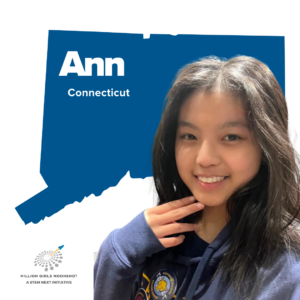
2024 FLIGHT CREW AMBASSADOR
Ann, Farmington, CT.
Ann is interested in pursuing a career as a robotics software engineer with a focus on machine learning in computer vision.
Ann enjoyed doing similar work on the FIRST Robotics Team where Ann used machine learning to program the robot to identify game pieces on the field.
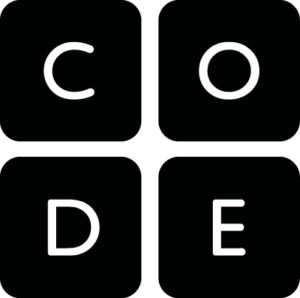 Organized by Code.org, the annual Hour of Code campaign is a global movement in 180+ countries that introduces young people to computer science through fun, age-appropriate learning activities. The Moonshot’s partnership with Code.org aims to expand that reach into afterschool.
Organized by Code.org, the annual Hour of Code campaign is a global movement in 180+ countries that introduces young people to computer science through fun, age-appropriate learning activities. The Moonshot’s partnership with Code.org aims to expand that reach into afterschool.
Learn more about the Hour of Code, download the Afterschool Guide for Hour of Code to explore activities and tutorials, and encourage programs to register as an official Hour of Code site to globally engage and take advantage of the full Hour of Code experience.
The CT After School Network is proud to be a part of the Million Girls Moonshot initiative, working to inspire and prepare the next generation of innovators by engaging one million more girls in STEM learning opportunities through afterschool and summer programs.
The Million Girls Moonshot will not only allow girls to envision themselves as future innovators, but it will increase the quality of out-of-school STEM learning opportunities for all young people, particularly underserved and underrepresented youth.
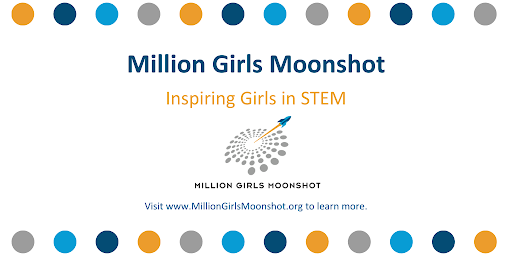
About the Million Girls Moonshot
The Moonshot is designed to spur girls’ interest, understanding, and confidence in STEM and equip them to become problem solvers with an engineering mindset. Led nationally by the STEM Next Opportunity Fund and the Charles Stewart Mott Foundation in partnership with the Intel Foundation and the Gordon and Betty Moore Foundation, the Million Girls Moonshot:
- Leverages afterschool networks in all 50 states to help school-age girls access high-quality STEM education, support, and mentors.
- Uses an equity and inclusion framework that is youth-centric and culturally responsive to increase gender, and racial and socio-economic diversity in STEM.
- Provides resources, support, mentorship, and expert guidance to help educators deliver hands-on STEM experiences in afterschool, out-of-school time, and summer learning programs.
